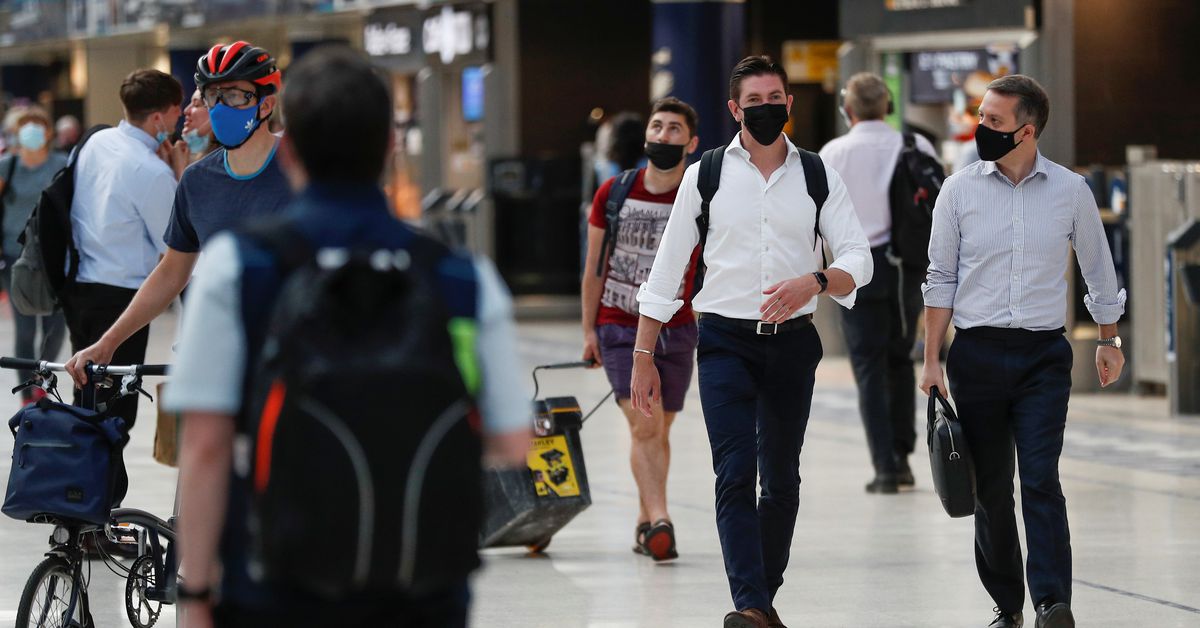UK virus cost-benefit discounts human psychology

Commuters walk through Waterloo station, amid the coronavirus disease (COVID-19) pandemic, London, Britain, July 19, 2021. REUTERS/Peter Nicholls/Files
LONDON, July 19 (Reuters Breakingviews) – The UK’s Covid-19 reopening leans heavily on a breezy view of human psychology. Prime Minister Boris Johnson on Monday broke ranks with states like Israel by lifting all virus-related restrictions. His basis for doing so amounts to a massive live experiment.
Johnson’s punt is unfortunately timed. On Monday, stock markets on both sides of the Atlantic slumped on news that the so-called Delta variant was spreading rapidly. In America, cases surged 70% last week compared to the previous seven-day period, according to the Centers for Disease Control and Prevention. In Spain, cases rose for the fourth week in a row and in France, Germany and Italy cases rose by over 100%. In the UK, cases rose by 44%, the tenth week of rises, according to JPMorgan.
The UK leader has one thing in his favour. On Sunday, Britain recorded 25 deaths, compared to 1,200 when daily cases last hit their current 55,000. That’s because 54% of the British adult population is fully inoculated, much higher than most other countries in Europe and Asia and on a par with Israel’s 58%. What happens next depends on what Britons do with their newfound freedom.
If all UK citizens reset their psychological clocks to before the pandemic, the UK economy could surge. In February UK lawmaker Layla Moran, who has been investigating Covid-19, said the annual cost of long-term ailments related to Covid-19 could reach 2.5 billion pounds annually. The UK Office for National Statistics, meanwhile, reckons the domestic hospitality industry lost 2.3 billion pounds in turnover in May alone from now-abolished restrictions like limits on indoor dining and bar occupancy.
That’s a pretty big “if” though. It’s just as likely that a critical mass of Britons pay attention to the continuing non-zero risk of infection and exercise caution going out to bars, restaurants and public gatherings, similar to if previous restrictions were still in place. Airlines and cruise ship groups were especially hard hit by Monday’s market slump.
Britons are especially likely to hang back if they observe what’s happening in countries with similarly high vaccination rates. Israel reimposed restrictions like indoor mask-wearing and curbs on large weddings as Covid-19 rates spiked over the past week. Germany, a country with far fewer infections than the UK, has no plan to remove restrictions. Johnson’s reopening hinges on the dubious assumption that he has a monopoly on wisdom.
Follow @aimeedonnellan on Twitter
CONTEXT NEWS
– European stock markets fell sharply on July 19 as Prime Minister Boris Johnson unveiled “freedom day”, ending over a year of Covid-19 lockdown restrictions in England.
– Europe’s STOXX 600 index fell 2.2% and was on course for its worst fall since Dec. 21 last year.
– The FTSE 100 share index fell to a two-month low. UK-listed shares of cruise operator Carnival and airlines easyJet and British Airways owner International Airlines Group fell 8.5%, 6.3% and 5% respectively as of 1315 GMT. The pound fell to a three-month low.
– In the United States, the S&P 500 fell 1.9% and the Nasdaq 100 fell 1.3% as of 1450 GMT.
– New U.S. Covid-19 cases surged 70% compared with the prior seven days to an average of 30,000 new infections a day, fuelled by the Delta variant, America’s Centers for Disease Control and Prevention said on July 16. Deaths rose 26% week-over-week to an average of 250 lives lost a day, mostly in unvaccinated patients.
Editing by George Hay and Oliver Taslic






